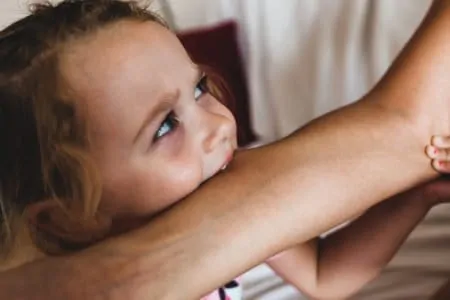You love your little one, but being their punching bag? Not so much. It is exhausting when a sweet toddler suddenly develops a habit of hitting when frustrated or biting when they don’t get their way.
The toddler years are a wild ride. They are full of milestones, but also tantrums, meltdowns, and tears.
If you are wondering how to stop your toddler from hitting and biting, you are not alone. To stop the behavior, we first have to understand why it’s happening. We have navigated this tricky phase and consulted child development experts to find solutions that actually work.
Here is how you can empower your toddler to manage their big feelings and restore peace in your home.
Key Takeaways
- Identify the trigger: Aggression usually stems from frustration, lack of communication skills, overstimulation, or curiosity.
- Stay calm: Reacting with anger or punishment often reinforces the behavior; model the calm self-control you want them to learn.
- Intervene immediately: Physically block the hit or bite gently, move to a quiet safe space, and validate their feelings while holding the boundary.
- Prioritize prevention: Use consistent routines, offer simple choices, and praise positive behavior to reduce triggers.
Why Toddlers Hit and Bite
There is no single reason why a child lashes out, but it usually boils down to a lack of impulse control and big emotions. Here are the most common culprits.
1. Experimenting
Toddlers are tiny scientists. They explore the world to learn cause and effect (1). Sometimes, this experiment involves whacking a playmate or biting your shoulder to see what happens.
Most toddlers experiment with hitting at least once. If they see it doesn’t get a positive reaction, they usually move on.
2. Trying to Communicate
Toddlers have needs just like adults, but they often lack the vocabulary to express them. Imagine being hungry, bored, or overwhelmed but unable to say so.
One-year-olds often resort to physical actions because they cannot verbally articulate their frustration. You might see them arching their backs, stomping, or banging their heads.
When the frustration peaks, they may hit or bite. It isn’t a sign of “bad” parenting; it is often just a sign of a language gap.
3. Defense Mechanism
Sharing is a complex social skill. Toddlers typically do not understand the concept of true sharing until at least age 3 (2).
If another child snatches a toy, a toddler’s natural instinct is to defend their territory. Since they lack the impulse control to pause and use words, they push, hit, or bite.
Impulse control is a skill that develops slowly and typically matures closer to age 5 (3). Until then, physical reactions are developmentally normal, even if they are behaviorally unacceptable.
4. Having an Off Day
We all have days where we feel grumpy, tired, or moody. Toddlers are no different.
If your child skipped a nap, is fighting a cold, or is just feeling “off,” their tolerance for frustration plummets. On these days, triggers that usually wouldn’t bother them can lead to a full-blown tantrum or aggressive outburst.
5. Feeling Scared
Aggression is a common “fight” response in the “fight, flight, or freeze” instinct. If a toddler feels threatened or cornered, they may lash out.
Surprisingly, this can sometimes look like laughter. Nervous laughter is a way children release tension. If your toddler hits and then laughs, they aren’t necessarily enjoying the pain they caused; they might be trying to regulate a surge of adrenaline (4).
It may also be because they think biting is a “game.” During office visits, I’ve seen toddlers smile, look at mom, bite her, and then laugh. Unless they are told otherwise, toddlers don’t realize that biting hurts.
Editor's Note:
Dr. Leah Alexander, MD, FAAP6. Teething Pain
When those final molars push through, the pain can be intense. Toddlers may bite objects, parents, or siblings in an attempt to relieve the pressure in their gums.
This phase can last until the 2-year molars come in, usually by 30 months (5). If your toddler is drooling and biting, check their gums.
7. Imitating Others
Toddlers are sponges. If they see hitting at daycare, on TV, or even from an older sibling, they will copy it.
This also applies to discipline. If a parent slaps a hand or spanks a child to stop behavior, the child learns that hitting is an acceptable response to frustration (6). This often backfires and increases aggressive behavior.
How to Stop a Toddler From Hitting and Biting
Breaking the habit requires patience and consistency. Here are the tactics that work best to stop the cycle.
1. Stop the Aggression Kindly
Safety comes first. If your toddler raises a hand to hit, intercept it. Gently but firmly hold their hand to block the blow.
Use a calm, low voice and say, “I won’t let you hit. Hitting hurts.” The goal is to set a boundary without adding more chaos to the situation (7).
2. Move to a Quiet Place
If you are in public or a busy room, scoop your child up and move to a quiet, private area. This removes the “audience” which can fuel the behavior and gives their nervous system a chance to reset.
When in a public place, I recommend taking the child back to the car until the tantrum or outburst resolves. Once your child is calm, you can resume your outing.
Editor's Note:
Dr. Leah Alexander, MD, FAAPShaming a child in front of others often increases distress (8). A “time-in” (sitting quietly with you) is often more effective than a “time-out” (isolation) for this age group because it helps them co-regulate.
3. Teach the Use of Words
Once the storm has passed and your toddler is calm, talk about what happened. Keep it simple: “You were mad because you wanted the truck. But we do not hit.”
Help them label their emotion. “Are you frustrated?” or “Are you sad?” Giving them the language to describe their feelings reduces the need to act them out physically.
Encourage them to use words next time. You can even role-play with dolls to practice “gentle hands” versus hitting.
Most Importantly
4. Allow the Meltdown
Sometimes, you block the hit, and the toddler collapses into tears. This is actually a win.
Crying allows them to release the built-up frustration safely. Instead of trying to stop the crying immediately, simply be there. Offer a hug if they want it, or just sit nearby. Once the wave of emotion passes, they will likely be much calmer.
5. Don’t Mimic the Behavior
It is a common myth that biting a child back will “show them how it feels.” Please do not do this. It models the exact behavior you are trying to stop (9).
If your toddler bites while nursing or cuddling, gently detach them, say “No biting,” and set them down for a moment. This teaches them that biting results in a loss of connection, not a reaction.
When it comes to biting in school or day care, I occasionally see a patient who has been bitten by another child. Understandably, the parents are very upset and concerned about possible infections. In the majority of cases, preventative antibiotics are not needed. Ensuring your child is immunized against Hepatitis B is an important preventative measure. Most establishments require this vaccine for attendance (10).
Editor's Note:
Dr. Leah Alexander, MD, FAAPHow to Prevent Hitting and Biting
Proactive parenting can stop many outbursts before they start.
1. Predict the Reaction
You know your child best. If you see them getting tight-lipped or clenching their fists at the playground, intervene early.
Step in before the hit happens. “It looks like you are having a hard time sharing. Let’s take a break.” This prevents the behavior and helps them learn to recognize their own limits.
2. Fill Their Emotional Cup
Toddlers crave connection. If they feel disconnected, they may act out to get attention (even negative attention is better than none).
Give specific praise when they are behaving well. “I love how gentle you are with the dog” is more effective than a generic “Good job.”
Avoid Scolding
3. Maintain a Schedule
Toddlers thrive on predictability. Knowing what comes next makes them feel safe.
Ensure they are getting enough sleep and plenty of active play. An overtired or under-stimulated child is a ticking time bomb. Aim for a mix of structured activity and free play to keep their energy balanced (12).
4. Offer Simple Choices
Toddlers desperately want independence. Give them power over small things to reduce power struggles over big things.
“Do you want the red cup or the blue cup?” implies they have to drink their water, but gives them autonomy over how they do it. This small “win” can prevent frustration from building up.
5. Provide Stimulation
Boredom can lead to aggression. If a toddler has nothing to do, they might create their own “excitement” by causing trouble.
Rotate activities every 20 to 30 minutes. It doesn’t have to be fancy; banging on pots, reading a book, or a dance party can reset their mood.
6. Distract and Redirect
When you see a storm brewing, change the channel.
If two kids are fighting over a toy, introduce a new, exciting toy. If they are cranky, suggest looking out the window at a garbage truck. Distraction is one of the most effective tools in the toddler years.
FAQs
The Takeaway
Hitting and biting are stressful behaviors, but they are also a normal part of toddler development. Your child isn’t “bad”, they are just learning how to be a person.
Remember that punishment often reinforces the habit. Instead, focus on kindly stopping the aggression, validating their feelings, and teaching them to use their words.
Stay consistent. It takes time for toddlers to learn impulse control, but with patience and calm guidance, this phase will pass. You are doing a great job guiding them through it.











